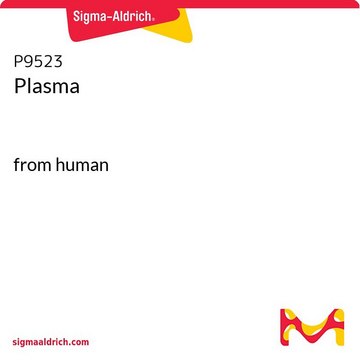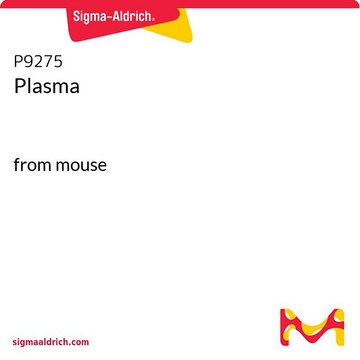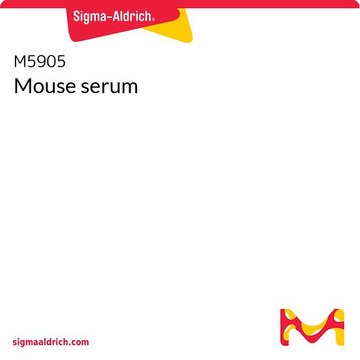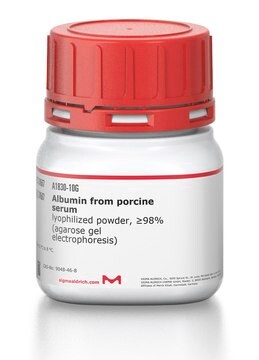Wszystkie zdjęcia(1)
Key Documents
P2891
Plasma
from pig
Synonim(y):
Citrated plasma
Zaloguj sięWyświetlanie cen organizacyjnych i kontraktowych
About This Item
Polecane produkty
pochodzenie biologiczne
pig
Poziom jakości
Postać
powder
zawiera
3.8% trisodium citrate as anticoagulant
temp. przechowywania
2-8°C
Szukasz podobnych produktów? Odwiedź Przewodnik dotyczący porównywania produktów
Opis ogólny
Plasma is the liquid part of the blood and lymphatic fluid, which makes up about half of its volume. Plasma is devoid of cells and, unlike serum, has not clotted. It is prepared from whole blood that is collected with anticoagulants (9:1) and centrifuged to remove cells and cellular debris. Some of the more common proteins found in plasma are albumin and prealbumin, α1-acid glycoprotein, transferrin, lipoproteins (HDL, LDL, and VLDL), immunoglobulins, complement proteins, and coagulation proteins (thrombin, plasminogin, and fibrinogen). Citrated plasma contains citrate (3.8% trisodium citrate) as an anticoagulant.
Plasma contains a variety of proteins with diverse functions. The primary functions of the plasma proteins include the maintenance of colloid osmotic pressure, pH, and electrolyte balance; the transport of metal ions, fatty acids, steroids, hormones, and drugs to various organs of the body; use as a source for amino acids for tissue nourishment; hemostasis and the prevention of thrombosis; the regulation of cellular activity and function through hormone signaling; and defense against invasion through the actions of antibodies and complement components.
Plasma contains a variety of proteins with diverse functions. The primary functions of the plasma proteins include the maintenance of colloid osmotic pressure, pH, and electrolyte balance; the transport of metal ions, fatty acids, steroids, hormones, and drugs to various organs of the body; use as a source for amino acids for tissue nourishment; hemostasis and the prevention of thrombosis; the regulation of cellular activity and function through hormone signaling; and defense against invasion through the actions of antibodies and complement components.
Zastosowanie
Plasma was used as a negative control to analyze porcine immunoglobulins in diets and faeces, using a modified radial immunodiffusion method.
Inne uwagi
This product is prepared from pooled porcine blood. It contains 3.8% trisodium citrate as an anticoagulant. It is tested for clotting, which indicates that the clotting factors in the product are active. However, it is not analyzed to determine whether other enzymes present are native or denatured. The resulting plasma is 0.45 microm filtered and lyophilized from the indicated volume.
Uwaga dotycząca przygotowania
Whole blood collected with anticoagulants (9:1), pooled, and centrifuged. The resulting plasma is 0.45 μm filtered and lyophilized from the indicated volumes.
This page may contain text that has been machine translated.
Kod klasy składowania
11 - Combustible Solids
Klasa zagrożenia wodnego (WGK)
WGK 3
Temperatura zapłonu (°F)
Not applicable
Temperatura zapłonu (°C)
Not applicable
Certyfikaty analizy (CoA)
Poszukaj Certyfikaty analizy (CoA), wpisując numer partii/serii produktów. Numery serii i partii można znaleźć na etykiecie produktu po słowach „seria” lub „partia”.
Masz już ten produkt?
Dokumenty związane z niedawno zakupionymi produktami zostały zamieszczone w Bibliotece dokumentów.
Klienci oglądali również te produkty
Porcine immunoglobulins survival in the intestinal tract of adult dogs and cats fed dry food kibbles containing spray-dried porcine plasma (SDPP) or porcine immunoglobulin concentrate (PIC)
Rodriguez C, et al.
Korean journal for food science of animal resources, 139(3-4), 201-211 (2007)
A I Potapovich et al.
British journal of pharmacology, 158(5), 1236-1247 (2009-09-30)
The immunomodulatory effects of alpha-fetoprotein (AFP) on lymphocytes and macrophages have been described in vitro and in vivo. Recombinant forms of human AFP have been proposed as potential therapeutic entities for the treatment of autoimmune diseases. We examined the effects
Nasz zespół naukowców ma doświadczenie we wszystkich obszarach badań, w tym w naukach przyrodniczych, materiałoznawstwie, syntezie chemicznej, chromatografii, analityce i wielu innych dziedzinach.
Skontaktuj się z zespołem ds. pomocy technicznej








